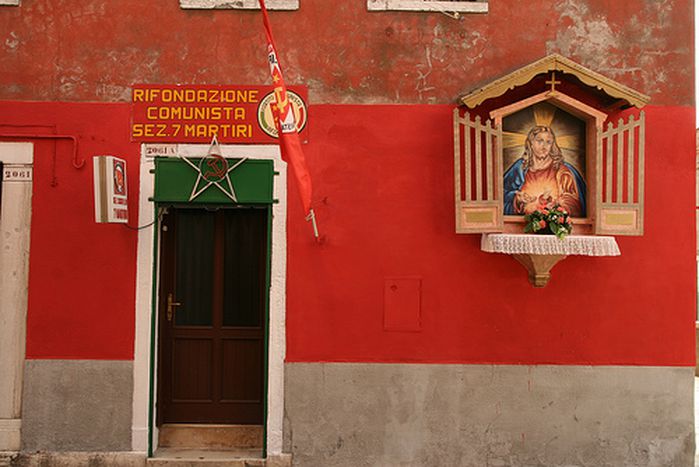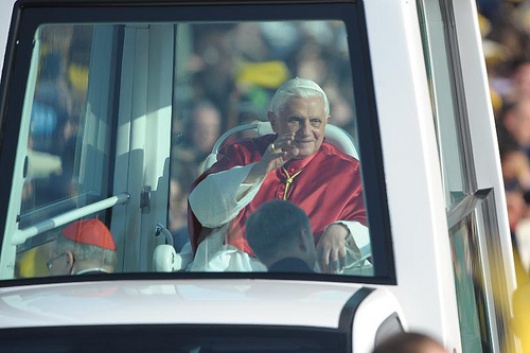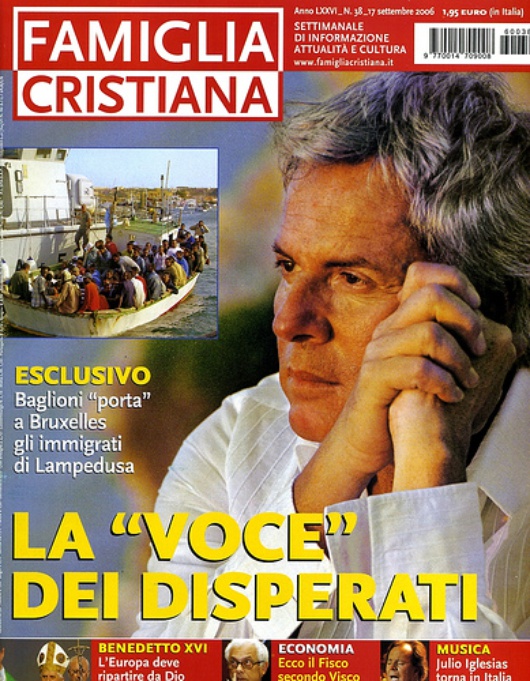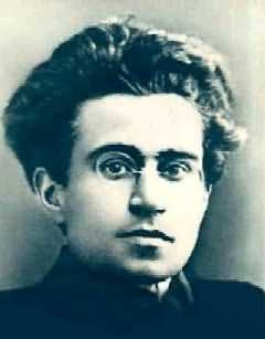
God is a communist and unaware of it
Published on
Translation by:
Susannah Readett-BayleyNow that the largest catholic political party are no longer present in parliament and the centre-left are significantly weakened, it is the Vatican who are playing the role of the greatest opposition to the Italian government. Others however denounce the church as ‘crypto-communist’
Italy’s opposition are preaching from the Vatican’s balcony: from the heated criticism of government action in areas like immigration, the Roma nomads of the redistribution of wealth to the recent revelations confirming that the Italian communist party founder, Antonio Gramsci, had converted to catholicism before he died... and that’s without taking into consideration the editors of the catholic weekly Famiglia Christiana.
The church is taking an openly political standpoint
It wasn’t hard to imagine a power struggle between the church and the state, except in today’s Italy it is no longer about the competencies of God and those of Caesar: today, in the midst of economic and social crisis and a crisis of values, the ancient spiritual institution is speaking out. Faced with an apolitical attitude of its leaders, the church is taking an openly political standpoint. Surely this is because the christian democratic union party and the centre democrats are not present in parliament: they didn’t win enough votes in the last election to reach the fateful 3% required. In the absence of these parties, the representation (even political) of Italian catholics has fallen into the hands of the Vatican.
When the Pope speaks his mind
 'I call on governments to finance banks so they do not fall into bankruptcy, and I call on banks to help the most excluded members of our society.’ This is not the conventional prayer we would expect from Benoit XVI who continues: 'University reform must ensure the freedom of teaching and research and their independence from economic and political powers.’ And on the cruelty of our times: 'Violence stems from inequality, from an unequal distribution of wealth and from a lack of initiatives from our leaders.’ He also takes a position on the destiny of immigrants and the Roma, on the significant numbers of military mobilised to ensure the ‘security’ of Italian cities and on fatal work accidents.
'I call on governments to finance banks so they do not fall into bankruptcy, and I call on banks to help the most excluded members of our society.’ This is not the conventional prayer we would expect from Benoit XVI who continues: 'University reform must ensure the freedom of teaching and research and their independence from economic and political powers.’ And on the cruelty of our times: 'Violence stems from inequality, from an unequal distribution of wealth and from a lack of initiatives from our leaders.’ He also takes a position on the destiny of immigrants and the Roma, on the significant numbers of military mobilised to ensure the ‘security’ of Italian cities and on fatal work accidents.
Like the Vatican, the Catholic publication Famiglia Cristiana has also been qualified as proto-communist: 'Not even just proto, but crypto-communist! That’s what we’ve been called on several occasions; as a magazine we analyse politics through decisions and facts. This government doesn’t help families; all we have done is to see this. Just one element among all the others that is backed up by statistical data, by research,’ explains editor-in-chief Alberto Bobbio.
 Is it too much to ask the government not to be so flagrant about the fact that when the right are in power, the rich get richer at the expense of the poor? This question, which was so embarrassing to Berlusconi, won the Famiglia Cristiana their label as ‘crypto-communist’. ’A news publication must denounce politicians when they are not doing their job properly,’ adds Bobbio. ’It monitors public authority: this is how it should work, isn’t it?'
Is it too much to ask the government not to be so flagrant about the fact that when the right are in power, the rich get richer at the expense of the poor? This question, which was so embarrassing to Berlusconi, won the Famiglia Cristiana their label as ‘crypto-communist’. ’A news publication must denounce politicians when they are not doing their job properly,’ adds Bobbio. ’It monitors public authority: this is how it should work, isn’t it?'
A powerless left
On the contrary, this is not the case at all for centre-left parties and newspapers targeted by the second Tangentopoli operation (many democrat leaders and administrators were arrested or interrogated for corruption scandals) where the question of eligibility for condemned parliament members or those under suspicion remains unresolved.
 What is surprising though is not the fact that the church and other catholic information organisms have taken a stand, but more that they are the only bodies to have formed any kind of constructive opposition, standing up for the most vulnerable and considering the common good. (November 2008’s monthly publication Tracce di Comunion et Liberazione included an article entitled Let’s take back employment). This is in fact, what lead to the creation of the communists during the first republic. It is perhaps this delayed enlightenment which led the Vatican to reveal Antonio Gramsci, founder of the Italian communist party’s conversion to catholicism after more than a year’s denial. Sickle, hammer and crucifix.
What is surprising though is not the fact that the church and other catholic information organisms have taken a stand, but more that they are the only bodies to have formed any kind of constructive opposition, standing up for the most vulnerable and considering the common good. (November 2008’s monthly publication Tracce di Comunion et Liberazione included an article entitled Let’s take back employment). This is in fact, what lead to the creation of the communists during the first republic. It is perhaps this delayed enlightenment which led the Vatican to reveal Antonio Gramsci, founder of the Italian communist party’s conversion to catholicism after more than a year’s denial. Sickle, hammer and crucifix.
Translated from Se Dio è più socialista di Cesare



